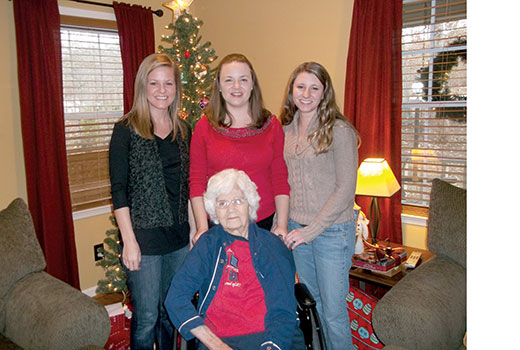On Thursday, Nov. 29, around midnight, surrounded by the people she loved most on this earth, my mother breathed her last breath. For over 12 years she struggled with Alzheimer’s, coupled with osteoarthritis and osteoporosis. Her battle was over, and even though this sinister and devastating disease viciously attacked her body and brain, it did not win.
In Matthew 10:28, Jesus said, “Do not fear those who kill the body, but are unable to kill the soul.” Alzheimer’s is a fearful disease, but it cannot touch the soul of a child of God.
For several years I struggled with how to pray for my mother. I came to the place where I simply asked God, among other things, to give my mother peace in her soul. When she breathed her last breath, it was so serenely peaceful in that room. It was an unforgettable moment. She was gone, but Alzheimer’s didn’t win. In the end, it just opened the door to a better life. The Apostle Paul said that it was much better to depart and be with Christ, but he stayed on in this life for the sake of God’s work and God’s people.
My mother loved me unconditionally, and as I grew older — and, hopefully, wiser — I saw how exceptional that was. She was the inspiration behind a book I wrote on the subject of worry, and she left a good and godly imprint on my life.
Pain is never an easy road to travel, and it must be scary when you cannot remember the most important people and things in your life. But God has promised to always be with His people. I believe He was with her as she died. Some medical professionals refer to the time when a person begins the dying process as transitioning. I believe it is at this time that a believer experiences God’s dying grace. I saw my prayers answered in the peaceful death of my mother. The atmosphere in the room seemed to change. In over 40 years of ministry, I have watched a handful of people die and have preached at many funerals. But this was my mother, and it was very different.
She was saved when I was a child. With limited memory, I do recall when she joined the church and was baptized. I also vaguely remember the graveside services for my younger brother and sister. She carried them to full term, but they died at, or just before, birth. There was a subtle sadness that she lived with after that, especially when she discovered she could not have other children. She really wanted a large family. But, when grandchildren came along, it seemed to inspire her to a new level.
My three daughters loved their grandmother, and she dearly loved them. They all wrote tributes to her. My wife, Anne, read them at the funeral, and I want to share some excerpts. Becky wrote, “She was a Titus 2 woman who taught us by example what was good so that we would be encouraged as young women to love our husbands and children and to be sensible, pure workers at home.” Katy said, “She was a kind, generous, gracious and hard-working woman who lived a life of humility and put her trust in Jesus as her Lord.” Cindy observed, “Never in my life did I doubt how much my grandparents loved me, and that is one of the greatest gifts I can imagine.”
It should not be, but often is, that a mother-in-law and daughter-in-law do not get along very well. That was not the case with Anne and my mother. Anne said, “I could not have asked for a better mother-in-law. She loved me and welcomed me into her family. When Rudy and I disagreed, she always took my side. Now that’s a good mother-in-law!”
When you watch someone struggle with Alzheimer’s, you understand more personally a description that has captured the pain of that journey: the disease of the long goodbye. You watch your loved one lose their cognitive skills, memory and so much more. It is a disease that takes different courses in its victims. Someone once noted, “When you know one Alzheimer’s patient, you know one Alzheimer’s patient.”
When death finally came to my mother, a grief I didn’t anticipate rolled over me like a tidal wave. As much as I hate Alzheimer’s, though, I know Alzheimer’s did not win.
First Corinthians 15:55-57 says, “O death, where is your victory? O death where is your sting? The sting of death is sin, and the power of sin is the law; but thanks be to God, who gives us the victory through our Lord Jesus Christ.”
My mother is with Jesus. She suffered and fought a good fight against a disease that takes no prisoners. While this disease is brutal, Alzheimer’s did not win. The love of Jesus won big time for my mother.

